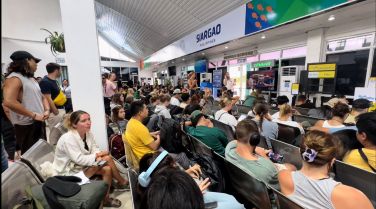Remittance slowdown leaves Philippines vulnerable – HSBC
MANILA, Philippines - The Hongkong and Shanghai Banking Corp. (HSBC) warned the slowdown in cash remittances from overseas Filipinos could leave the Philippines more exposed to global cyclical currents.
HSBC economist Joseph Incalcaterra said the share of remittances to both the gross domestic product (GDP) and the current account (CA) would decrease as the Philippine economy moves into a period of sustained higher growth compared to the past decades.
“This means the Philippines’ natural external buffer that has provided a back-stop for growth in times of challenges may erode, leaving the Philippines slightly more exposed to global cyclical currents,” he said.
HSBC said remittances not only drive private consumption, which accounts for almost 75 percent of Philippine GDP, but keep the country’s current account entrenched in surplus, offsetting the structural trade deficit.
“Remittance growth has been remarkably resilient over the years, shrugging off both financial crises and economic slowdowns alike … until 2015,” he added.
The Bangko Sentral ng Pilipinas has slashed the growth target for cash remittances to four percent instead of five percent for 2015 and 2016 due to the global economic slowdown and the depreciating currencies in host countries against the greenback.
Latest data from the central bank showed cash remittances went up by 3.6 percent to $22.83 billion in the first 11 months of last year from $22.08 billion in the same period in 2014.
About 79 percent of the cash remittances came from the US, Saudi Arabia, the United Arab Emirates, Singapore, the United Kingdom, Japan, Canada, and Hong Kong.
Incalcaterra said a confluence of factors could explain the dramatic slowdown in the second half of 2015. “Geographically, the sharp decline in remittances from the US has been the main source of the deceleration, while remittance growth from Asia and the Middle East remains relatively strong,” he noted.
He also blamed stricter financial regulations, higher bank transaction costs, foreign exchange weakness in domicile currencies, for the sluggish growth of remittances.
“There are also some tail risks from tensions in the Middle East, such as further political instability or unlikely currency devaluations,” Incalcaterra added.
BSP deputy governor Diwa Guinigundo earlier downplayed the impact of the rising tension between Saudi Arabia and Iran on the growth of cash remittances.
“In the past we had the 1991 Gulf War and the 2003 second gulf war, but our overseas Filipino workers were able to move elsewhere and find alternative employment,” he said.
However, he said the flexibility of overseas Filipinos would be affected if the conflict spreads to other countries in the Middle East.
“My concern is that if the Saudi-Iran conflict extends beyond their respective borders and affect all the contiguous jurisdictions, then we will have some challenges,” Guinigundo warned.
Incalcaterra said services exports from the business process outsourcing (BPO) and related sectors would partly offset the relative decline of foreign currency earnings from remittances.
“While services exports, driven by BPO, will likely overtake remittances this year, from a net export perspective it will not offset the magnitude for several years according to our calculations,” he added.
He said the current account surplus could nonetheless weaken by 2017 unless the trade deficit sees a sustained improvement.
- Latest
- Trending




























